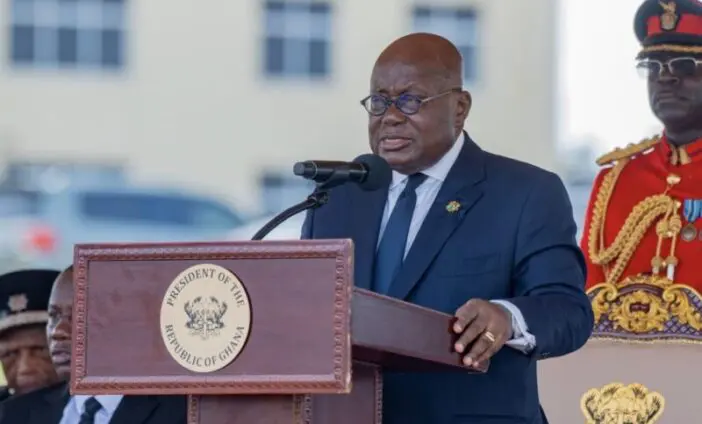President Nana Addo Dankwa Akufo-Addo has highlighted his administration’s significant strides in the health sector, calling the achievements unmatched in Ghana’s history. A major component of these efforts is the government’s Agenda 111 initiative, which seeks to enhance healthcare accessibility and infrastructure nationwide.
Launched in 2020, Agenda 111 aims to construct 111 hospitals across various districts, regions, and specialized areas in the country. The project includes the building of:
• 101 district hospitals to ensure that every district has a hospital,
• 6 regional hospitals in newly created regions,
• 2 specialized psychiatric hospitals in Kumasi and Tamale,
• The redevelopment of the Accra Psychiatric Hospital.
President Akufo-Addo emphasized that the completion of some of these projects would significantly improve healthcare delivery by increasing access to quality medical services, reducing travel time for healthcare, and addressing regional disparities in health infrastructure. He also indicated that the initiative would help modernize Ghana’s healthcare system, making it more resilient in the face of public health challenges like the COVID-19 pandemic.
The government has also invested in upgrading existing hospitals, expanding healthcare training facilities, and procuring modern medical equipment to boost service delivery. However, despite these ambitious plans, some have raised concerns about project delays, funding challenges, and the capacity to sustain the newly built facilities. Nonetheless, the administration remains committed to transforming Ghana’s healthcare landscape through Agenda 111 and other health sector reforms. During the commissioning of the new Urology and Nephrology Centre of Excellence at Korle Bu Teaching Hospital on October 18, President Nana Addo Dankwa Akufo-Addo emphasized his administration’s dedication to advancing healthcare services and reducing mortality rates in Ghana. He highlighted the significant progress in lowering maternal, adolescent, and child mortality, which he attributed to the government’s targeted efforts in tackling pressing health challenges. These achievements, according to the President, serve as clear indicators of the government’s commitment to improving healthcare delivery across the country.
The Urology and Nephrology Centre of Excellence is a major addition to Korle Bu Teaching Hospital, one of the leading medical facilities in Ghana. It is expected to provide specialized care for patients with kidney and urological conditions, reducing the need for Ghanaians to seek treatment abroad. The centre’s establishment aligns with the broader national strategy to enhance specialized medical services and increase access to quality healthcare.
President Akufo-Addo reaffirmed the government’s ongoing commitment to prioritizing the health sector. Beyond infrastructure, this focus includes increasing investments in medical personnel training, equipping health facilities with modern technology, and improving overall healthcare accessibility. The President’s remarks underscored the administration’s agenda of not only expanding health infrastructure through initiatives like Agenda 111 but also addressing critical areas that impact health outcomes, such as maternal and child health.
These efforts reflect the government’s goal to meet the healthcare needs of the population, ensuring that no one is left behind in accessing quality health services.
President Nana Addo Dankwa Akufo-Addo has highlighted the significant expansion of Ghana’s healthcare infrastructure, noting that between 2017 and August 2024, the country added approximately 8,665 hospital beds. This increase brought the total number of hospital beds from 24,153 in 2016 to 32,818, representing a 36% rise in capacity. The expansion underscores the government’s commitment to enhancing healthcare infrastructure to meet the growing needs of the population. Importantly, these figures do not include the additional beds that will be provided by the ongoing Agenda 111 Project, which aims to further expand healthcare access across the country.
In addition to increasing hospital bed capacity, President Akufo-Addo emphasized the government’s efforts in reducing maternal, adolescent, and child mortality rates, showcasing improvements in key health outcomes. The Institutional Maternal Mortality Ratio (IMMR) has seen a steady decline, dropping from 127.3 deaths per 100 live births in 2018 to 102.1 in recent years. This progress reflects the impact of targeted initiatives aimed at improving maternal and child health, as well as strengthening the overall healthcare system.
The commissioning of the new Urology and Nephrology Centre of Excellence at Korle Bu Teaching Hospital marks a significant step in boosting the country’s capacity to offer specialized medical care. The centre is expected to enhance the quality of services for patients with kidney and urological conditions, reducing the need for overseas treatment and further demonstrating the government’s commitment to investing in the health sector. These efforts are part of a broader strategy to provide comprehensive healthcare improvements, addressing both infrastructure and critical health indicators to ensure a healthier future for all Ghanaians.









